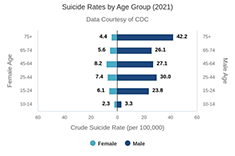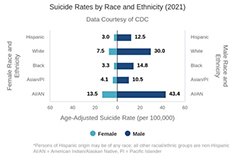FACTS AND FIGURES
Learn about statistics, trends, and other relevant insights for behavioral health practitioners working to reduce health disparities and improve outcomes for people in underserved communities.
Suicide Rates among Males
Suicide is a leading cause of death in the United States and a significant public health concern,
accounting for over 48,100 deaths in 2021.
1 According to the Centers for Disease Control and
Prevention (CDC), in 2021, the suicide rate among males was 22.8 per 100,000, compared to the rate
of 5.7 per 100,000 observed among females, revealing a significant disparity in suicide rates between
genders.
1 This discrepancy suggests underlying differences in behavioral patterns, societal expectations,
and possibly differential access to or utilization of mental health resources. For example, over 6 million
men in the U.S. reportedly suffer from depression, which is a significant factor contributing to
suicide. Despite its prevalence, however, depression in men is frequently underdiagnosed, potentially due
to prevailing cultural norms that equate emotional expression with weakness, discouraging men from seeking
help.
2 Furthermore, the highest suicide rates were observed in males aged 75 and older (42.2 per 100,000) and
among non-Hispanic American Indian/Alaskan Native males (43.4 per 100,000), followed by non-Hispanic White males
(30.0 per 100,000).
3 These statistics underscore the influence of age and ethnicity on suicide rates and highlight
the need for targeted research and intervention strategies.
Suicide Rates by Age Group (2021)

Suicide Rates by Race and Ethnicity (2021)

SAMHSA provides resources to support men’s mental health.
References
- Centers for Disease Control and Prevention. (2024). Web-based Injury Statistics Query and Reporting System
(WISQARS). Atlanta, GA: National Centers for Injury Prevention and Control, Centers for Disease Control and
Prevention. Retrieved from https://www.cdc.gov/injury/wisqars/index.html
 .
.
- Stiawa, M., Müller-Stierlin, A., Staiger, T., Kilian, R., Becker, T., Gündel, H., & Krumm, S. (2020). Mental health professionals view about the impact of male gender for the treatment of men with depression-a qualitative study. BMC psychiatry, 20, 1-13.
- National Institute of Mental Health (NIMH). Men and Mental Health
